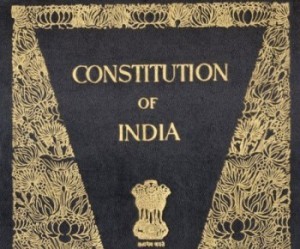The Part III of the Constitution of India gives a detailed description on a charter of rights called the ‘Fundamental Rights’. These fundamental rights guarantee civil freedom to all the citizens of India to allow them to live in peace and harmony. These are the basic rights that every Indian citizen has the right to enjoy, irrespective of their caste, creed and religion, place of birth, race, color or gender. These fundamental rights include Right to Equality, Right to Freedom, Right to Freedom of Religion, Cultural and Education Rights, Right against Exploitation, Right to Constitutional Remedies, etc.
Right to Equality :
- Equality Before Law(equality before the law is a somewhat negative concept because it prohibit the state to give any privilege treatment to any person before law ) and Equal protection of Laws(Which means equal treatment for all by law, it is considered as positive concept because priority can be given to neglected strata of the society ) .( Article 14).
- No discrimination on the basis of religion, caste, sex or place of birth in public places. (Article 15).
- No discrimination on the basis of religion, caste, sex or place of birth in case of Employment. (Article 16).
- Ban on untouchability.(Article 17).
- Ban on Titles.The only exception made to the strict rule of non-recognition of titles is that provided in favour of academic or military distinctions(Article 18).
Right To Freedom:
- Article 19: This article is called by Pt. Jawaharlal Nehru as “Clusters of Freedom”. This article include Right of speech and expression, Right to form unions and association, Right to roam anywhere in the country, and right to do business anywhere in the country.
- No one can be convicted for the same offence twice and compelled to witness against himself.(Article 20).
- Right to Life.(Article 21).
- Right to education(Article 21 A: This article was added by 86th Amendment ,2002)
Right Against exploitation: It prohibit the human trafficking and child labour (Article 23 and Article 24)
Right to Freedom of Religion(Article 25 to Article 28):
- Every religion has the right to propagate and buy property on the name of religion.
- No tax on religion.(Article 27).
Cultural and Education Right:
- No discriminations on the basis of language, script or culture.(Article 29).
- Right of minorities (Religious and Cultural) to open educational institutions.(Article 30)
- This fundamental right is for the protection of minorities.
Right of Constitutional Rights (Article 32): A declaration of fundamental rights is meaningless unless there is an effective machinery for the enforcement of the rights. Hence the framers of the Constitution were in favour of adopting special provisions guaranteeing the right to constitutional remedies.
- This Fundamental right is called as “Heart and Soul of the Indian Constitution” by B.R. Ambedkar.
- Under this article Supreme court can issue five writs:
- Habeas corpus – ‘You may have the body’ (a person unlawfully detained is sought to be set at liberty)
- Mandamus: ‘We order’ (commanding a person or a body to do that which it is his, or its duty)
- Prohibition: Issued primarily to prevent an inferior court from exceeding its jurisdiction
- Certiorari: Orders the removal of a suit from an inferior court to a superior court
- Quo warranto: Restrains a person from acting in a office to which he is not entitled





